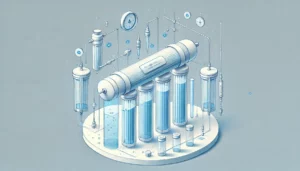How does a carbon water filter work
Carbon water filters are extensively used in commercial industries for water treatment due to their ability to effectively remove impurities and improve water quality. But how do these filters actually work?
Activated carbon, also known as activated charcoal, is the key component of a carbon water filter. It is a highly porous material that is created by heating carbon-rich materials, such as coconut shells or coal, at high temperatures. This process creates tiny pores and increases the surface area, allowing the activated carbon to effectively adsorb contaminants from the water.
When water passes through the carbon water filter, the activated carbon attracts and traps impurities through a process called adsorption. It works by chemically binding the contaminants to the surface of the carbon, removing them from the water and leaving behind clean, filtered water.
The adsorption process is particularly effective in removing organic compounds, chlorine, pesticides, herbicides, and volatile organic compounds (VOCs) from the water. Additionally, activated carbon can also improve the taste and odour of the water by removing unpleasant smells and flavours.
How long does a carbon water filter last
The lifespan of a carbon water filter depends on various factors, including the quality of the filter, the level of impurities in the water, and water usage. In general, a carbon water filter can last anywhere from three to six months.
Regular maintenance and filter replacement is essential for the proper functioning and longevity of a carbon water filter. Over time, the activated carbon becomes saturated with contaminants, reducing its effectiveness. It is important to follow the manufacturer’s guidelines and replace the filter at the recommended intervals.
If the water being filtered contains high levels of impurities or if the filter is used in a high-volume setting, it may need to be replaced more frequently. Regular monitoring of the filter’s performance and testing the water quality can help determine when the filter needs to be replaced.
Why activated carbon filter for water treatment
Activated carbon filters are highly preferred for water treatment in commercial industries for several reasons. Here are some key benefits of using activated carbon filters:
- Effective removal of contaminants: Activated carbon filters can effectively remove a wide range of contaminants from water, including chlorine, volatile organic compounds (VOCs), pesticides, herbicides, and organic compounds. This ensures that the water is safe and clean for various industrial processes and purposes.
- Improved taste and odour: The activated carbon in these filters can remove unpleasant tastes and odours from the water, resulting in better-tasting and better-smelling water. This is particularly important in industries where water is used for beverage production or food processing.
- Versatility: Carbon water filters can be used in various applications, including drinking water systems, water purification systems, and industrial processes. They can be easily integrated into existing water treatment systems, making them a versatile choice for commercial industries.
- Environmentally friendly: Activated carbon filters are environmentally friendly as they do not use any chemicals for water purification. They rely on the adsorption process, which is a natural and sustainable mechanism.
What does a carbon water filter remove
One of the primary functions of a carbon water filter is to remove various impurities from water. Here are some common contaminants that a carbon water filter can effectively remove:
- Chlorine: Carbon filters can efficiently remove chlorine, which is commonly used in water disinfection. Chlorine can leave a strong odour and taste in water, and the activated carbon in these filters can eliminate these undesirable qualities.
- Volatile organic compounds (VOCs): VOCs are organic chemicals that can be harmful to human health. Examples of VOCs include benzene, toluene, and xylene. Activated carbon filters can effectively adsorb these compounds, making water safer to use.
- Pesticides and herbicides: Agricultural runoff and contaminated water sources can contain traces of pesticides and herbicides. Carbon water filters are capable of removing these harmful substances, ensuring the water is free from agricultural contaminants.
- Organic compounds: Carbon filters can also remove various organic compounds, including certain types of industrial chemicals and pharmaceutical residues. This helps in reducing the potential health risks associated with consuming water contaminated with these substances.
Unknown facts about carbon filters
While you now have a good understanding of how carbon water filters work and their benefits, here are some lesser-known facts about carbon filters:
- Carbon filters do not remove all minerals: While carbon filters are excellent at removing contaminants, they do not remove essential minerals from water. Some minerals, such as calcium, magnesium, and potassium, can actually be beneficial for our health.
- They can improve air quality too: Activated carbon filters are not limited to water purification alone. They are also widely used in air purifiers to remove odours, gases, and volatile organic compounds from the air, providing cleaner and healthier indoor environments.
- Activated carbon is recyclable: Activated carbon used in filters can be recycled and reused. This helps reduce waste and makes carbon filters an environmentally friendly option.
Conclusion
In conclusion, carbon water filters are highly effective in removing impurities and improving the quality of water in commercial industries. The adsorption process of activated carbon ensures the removal of contaminants, including chlorine, VOCs, pesticides, herbicides, and organic compounds. Regular maintenance and filter replacement are essential for the longevity of carbon water filters.
With their versatility, environmental friendliness, and ability to improve taste and odour, using activated carbon filters for water treatment in commercial industries is a smart choice.
Need help?
If you are looking for reliable and efficient water treatment solutions for your commercial industry, contact Wychwood Water Systems. Our expert team can provide you with high-quality carbon water filters that will improve the quality and safety of your water supply. Don’t compromise on the health and well-being of your business – choose our advanced water treatment solutions today.
Wychwood Water Systems – Your Trusted Partner for Clean Water.
To find out more about how we could help you recycle your water, including the designing, manufacturing, installing & commissioning, servicing, and refurbishment of water purification systems, request a Free consultation to find the commercial water treatment solution you’ve looking for.





